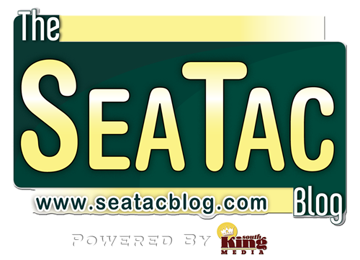[EDITOR’S NOTE: The following is a Letter to the Editor, submitted by a verified resident. It does not necessarily reflect the opinions of South King Media, nor its staff:]
Dear Port of Seattle Commissioners Ryan Calkins, Sam Cho, Fred Felleman, Toshiko Hasegawa, and Hamdi Mohamed, as well as the Port of Seattle, City of Seattle, King County, WA, Washington State and surrounding area personnel, officials and affiliated companies, departments and individuals/groups of interest.
I write to you today to ask that the Port of Seattle keep North SeaTac Park of City of SeaTac, WA whole and preserve critical forest and green space infrastructure on Port-owned land in our near-airport community.
Please don’t destroy this park and develop on it. So many people count on the park not only for their health provided by the oxygen of the trees, but also by the general enjoyment of the park and the community that it creates with everyone.
I personally go to the park 4-5 times a week with my dog and we enjoy walking in the beautiful trails. Please don’t take this away from us.
Please, I beg of you, do not destroy this land. Do not take it away from us, the people who live here. This would be an atrocity. This area and its people have already been victims of stolen land. Like the Duwamish natives whose land was stolen, the, what your website calls a “special purpose government” is again going to steal land away from its people and this is wrong.
Please.. This park serves a special purpose. Please live up to your name which is authorized by the State of Washington and keep your agency and this park special. I believe what you are suggesting is a wrongdoing and urge you to reconsider this horrible plan of yours to destroy nature.
There are so many people from all walks of life that come here. Sports players, families, cyclists, exercisers, happy people, lonely people, people is search for nature within the city, people in search for clean air in the city, pets, family members, friends, and many others who love this park.
Myself and thousands of others are uniting together.
There is one group in particular that is very passionate about this issue. They are DEFENDERS OF NORTH SEATAC PARK, as seen on the Defenders of North SeaTac Park website https://www.kctreeequity.org/
As outlined in the petition on their website, they specifically are calling out the below:
—————————————————————————————————-
𝐂𝐀𝐋𝐋𝐈𝐍𝐆 𝐅𝐎𝐑 𝐄𝐌𝐄𝐑𝐆𝐄𝐍𝐂𝐘 𝐀𝐂𝐓𝐈𝐎𝐍 𝐀𝐍𝐃 𝐋𝐎𝐍𝐆 𝐓𝐄𝐑𝐌 𝐒𝐎𝐋𝐔𝐓𝐈𝐎𝐍𝐒 𝐁𝐘 𝐎𝐔𝐑 𝐄𝐋𝐄𝐂𝐓𝐄𝐃 𝐎𝐅𝐅𝐈𝐂𝐈𝐀𝐋𝐒 𝐓𝐎 𝐃𝐄𝐅𝐄𝐍𝐃 𝐓𝐇𝐄 𝐇𝐄𝐀𝐋𝐓𝐇 𝐎𝐅 𝐏𝐄𝐎𝐏𝐋𝐄 𝐈𝐍 𝐓𝐇𝐄 𝐍𝐎𝐑𝐓𝐇 𝐒𝐄𝐀𝐓𝐀𝐂 𝐏𝐀𝐑𝐊 𝐂𝐎𝐌𝐌𝐔𝐍𝐈𝐓𝐘 𝐀𝐍𝐃 𝐖𝐈𝐓𝐇𝐈𝐍 𝐓𝐄𝐍 𝐌𝐈𝐋𝐄𝐒 𝐎𝐅 𝐒𝐄𝐀𝐓𝐀𝐂 𝐈𝐍𝐓𝐄𝐑𝐍𝐀𝐓𝐈𝐎𝐍𝐀𝐋 𝐀𝐈𝐑𝐏𝐎𝐑𝐓 𝐁𝐘 𝐏𝐑𝐎𝐓𝐄𝐂𝐓𝐈𝐍𝐆 𝐓𝐇𝐈𝐒 𝐂𝐎𝐌𝐌𝐔𝐍𝐈𝐓𝐘’𝐒 𝐆𝐔𝐀𝐑𝐃𝐈𝐀𝐍 𝐅𝐎𝐑𝐄𝐒𝐓𝐒, 𝐖𝐀𝐓𝐄𝐑𝐖𝐀𝐘𝐒, 𝐏𝐀𝐑𝐊𝐋𝐀𝐍𝐃𝐒, 𝐀𝐍𝐃 𝐓𝐑𝐄𝐄𝐒.
————————————————————-
In order to defend the people in the community surrounding North SeaTac Park, and all people living within the ten-mile community surrounding this airport, from the negative health and climate impacts posed by near-term plans for extensive deforestation as and green space destruction by the Port of Seattle, the current owner and assigned steward of North SeaTac Park, We call for:
———-
𝐎𝐍𝐄
———-
𝐋𝐞𝐠𝐚𝐥𝐥𝐲-𝐛𝐢𝐧𝐝𝐢𝐧𝐠 𝐬𝐞𝐜𝐮𝐫𝐞𝐦𝐞𝐧𝐭 𝐨𝐟 𝐍𝐨𝐫𝐭𝐡 𝐒𝐞𝐚𝐓𝐚𝐜 𝐏𝐚𝐫𝐤 𝐚𝐬 𝐚 𝐏𝐚𝐫𝐤 𝐢𝐧 𝐏𝐞𝐫𝐩𝐞𝐭𝐮𝐢𝐭𝐲 𝐰𝐢𝐭𝐡 𝐚 𝐩𝐞𝐫𝐦𝐚𝐧𝐞𝐧𝐭 𝐩𝐫𝐨𝐡𝐢𝐛𝐢𝐭𝐢𝐨𝐧, 𝐰𝐢𝐭𝐡𝐢𝐧 𝐭𝐡𝐞 𝐩𝐚𝐫𝐤, 𝐭𝐨 𝐜𝐨𝐦𝐦𝐞𝐫𝐜𝐢𝐚𝐥 𝐝𝐞𝐯𝐞𝐥𝐨𝐩𝐦𝐞𝐧𝐭 𝐚𝐧𝐝 𝐭𝐫𝐞𝐞 𝐫𝐞𝐦𝐨𝐯𝐚𝐥. This may be accomplished by changes in zoning and law, by conservation easement, by transfer or sale of this park land to an appropriate governmental entity, or by a combination of these or other means.
The Port caused the removal by eminent domain of thousands of residents, along with their homes and schools, from the land that this park now occupies. The Port has acknowledged that the creation of the park was “the culmination of a long term and very open planning process to compensate the area’s residents for cumulative airport impacts.” (1) This measure would honor that expressed intent of the Port.
———-
𝐓𝐖𝐎
———-
𝐀𝐧 𝐢𝐦𝐦𝐞𝐝𝐢𝐚𝐭𝐞 𝐦𝐨𝐫𝐚𝐭𝐨𝐫𝐢𝐮𝐦 𝐨𝐧 𝐭𝐫𝐞𝐞 𝐫𝐞𝐦𝐨𝐯𝐚𝐥 𝐚𝐧𝐝 𝐠𝐫𝐞𝐞𝐧 𝐬𝐩𝐚𝐜𝐞 𝐝𝐞𝐬𝐭𝐫𝐮𝐜𝐭𝐢𝐨𝐧 𝐛𝐲 𝐭𝐡𝐞 𝐏𝐨𝐫𝐭 𝐨𝐟 𝐒𝐞𝐚𝐭𝐭𝐥𝐞 𝐨𝐧 𝐩𝐮𝐛𝐥𝐢𝐜 𝐥𝐚𝐧𝐝𝐬 𝐰𝐢𝐭𝐡𝐢𝐧 𝟐 𝐦𝐢𝐥𝐞𝐬 𝐨𝐟 𝐒𝐞𝐚𝐓𝐚𝐜 𝐈𝐧𝐭𝐞𝐫𝐧𝐚𝐭𝐢𝐨𝐧𝐚𝐥 𝐀𝐢𝐫𝐩𝐨𝐫𝐭 with exceptions only for targeted measures to protect public safety or the health of the surrounding natural ecosystem, or to prevent substantial physical damage to existing private or public property, when these objectives cannot be reasonably achieved through other means.
This call for action responds to the recommendation of Public Health – Seattle & King County (PHS&KC) to increase green space and tree coverage, particularly coniferous trees, within ten miles of SeaTac International Airport in order to reduce human exposure to airport-generated pollutants known to cause disease and shorten lives. (2) PHS&KC has found that, with severity increasing as proximity to the airport increases, lifespans in this ten-mile area are between 1.7 and 5 years shorter than in the balance of the county; premature births, low birthweights, and childhood learning problems are more common; and rates of cancer, and heart, respiratory, and cardiovascular disease are significantly higher. (2)
Furthermore, this call is put forth in order to safeguard human health in a community where residents experience high levels of environmental health disparities as measured by the Washington State Department of Health. (3)
Furthermore, this call holds the Port of Seattle and our greater community accountable to the principles of environmental justice required under Presidential Executive Order 12898 and US Department of Transportation Order 5610.2. That order requires that activities that would have “a disproportionately high and adverse effect on minority populations or low-income populations” be avoided or mitigated when practicable. (4, 5)
As reported by PHS&KC, “the majority of people in King County identifying as Black/African American, Hispanic/Latino, and Native Hawaiian/Pacific Islander live in communities within 10 miles of the airport”, “a greater proportion of people in these communities are immigrants, and a slightly higher proportion are children,” and the percentage of people in near poverty or poverty increased the closer you are to the airport”, ranging from 37.2% – 24.4% within ten miles of the airport as compared with 16.1% in the balance of the county. These poverty rates are even higher for children. (2)
This moratorium must go into effect immediately in order to prevent the Port of Seattle from implementing its current near-term plans that would result in significant reduction of green space and tree coverage in this community, and must continue until the CARE Plan for the Greater North SeaTac Park Community, as outlined below, or a plan with comparable protections for our community’s health, is in place.
———-
𝐓𝐇𝐑𝐄𝐄
———-
𝐀 𝐩𝐥𝐚𝐧 𝐟𝐨𝐫 𝐂𝐨𝐦𝐩𝐫𝐞𝐡𝐞𝐧𝐬𝐢𝐯𝐞 𝐀𝐜𝐭𝐢𝐨𝐧 𝐭𝐨 𝐑𝐞𝐬𝐭𝐨𝐫𝐞 𝐭𝐡𝐞 𝐄𝐜𝐨𝐥𝐨𝐠𝐲 𝐨𝐟 𝐍𝐨𝐫𝐭𝐡 𝐒𝐞𝐚𝐓𝐚𝐜 𝐏𝐚𝐫𝐤 𝐚𝐧𝐝 𝐂𝐨𝐦𝐦𝐮𝐧𝐢𝐭𝐲 (CARE Plan), by the Port of Seattle and other partnering jurisdictions, that is fully funded and professionally managed, in order to restore and maintain for future generations the natural areas within and surrounding North SeaTac Park, including forests and waterways and with emphasis on Tub Lake and its prehistoric peat bog, a type of wetland that is highly environmentally sensitive and increasingly rare in King County.
The plan must include control of invasive weeds and preparation for existing and expected climate impacts such as drought, high heat, and pests.
It must, in a manner and at a scale recommended by experts in urban forestry and public health, propose specific steps to implement the recommendation made by Public Health Seattle & King County to increase green space and tree coverage, particularly coniferous trees, near SeaTac Airport in order to reduce residents’ exposure to toxics from airport operations.
It must protect and retain existing trees, as large-diameter trees can capture more toxic particulates, store “disproportionally massive amounts of carbon,” and “fulfill a variety of unique ecological roles such as increasing drought-tolerance, reducing flooding from intense precipitation events, altering fire behavior, redistributing soil water, and acting as focal centers of mycorrhizal communication and resource sharing networks.” (6)
It should set a goal of restoring urban tree canopy coverage in this community from its current low averages, for example, of 21% in SeaTac (25% not including the airport), 30% in Burien, and 29% in Des Moines, to 40% or more, as recommended by Forterra NW in three studies that it prepared for the Port of Seattle Airport Community Ecology Fund. (7-9)
And it must include concrete actions to limit, to the extent reasonably possible, development activities of the Port of Seattle within ten miles of the airport to its existing developed footprint. The Port controls sprawling multi-acre, single-level parking lots as well as other already-paved and underutilized properties, where redevelopment with higher density approaches are feasible and ecologically sound.
In addition to the above group there are many other communities online, as well as articles being written about this to call people to action and bring awareness. Below are just a few of them:
- https://b-townblog.com/letter-i-am-writing-to-urge-neighbors-to-weigh-in-on-two-new-policies-being-developed-by-the-port-of-seattle/
- https://crosscut.com/investigations/2023/09/effort-save-seatacs-biggest-forest-amid-airport-expansion
- https://www.king5.com/article/news/local/port-seattle-study-north-seatac-park-pushback-residents/281-9f28b391-55a0-4d6f-ad7f-3ead5568962e
- https://seatacblog.com/2022/05/12/seatac-city-council-approves-resolution-to-explore-acquiring-north-seatac-park/
- https://www.reddit.com/r/Seattle/comments/um9hkl/update_for_save_north_seatac_park_please_send/
- https://www.seattletimes.com/seattle-news/proposal-to-pave-over-seatac-park-with-a-parking-lot-draws-community-ire/
- https://b-townblog.com/city-of-seatac-hoping-to-take-ownership-of-north-seatac-park-from-port-of-seattle/
Please…I beg you once again. Don’t destroy the North SeaTac Park. Please do not develop this sacred land.
Thank you
– Turner Bradcliff
King County Resident
EDITOR’S NOTE: Do you have something you’d like to share with our highly engaged local Readers? If so, please email your Letter to the Editor to scott@southkingmedia.com and, pending review and verification that you’re a real human being, we may publish it. Letter writers must use their full names and cite sources – as well as provide an address and phone number (NOT for publication but for verification purposes).


Recent Comments